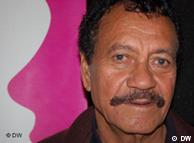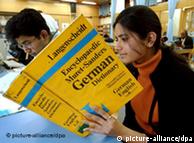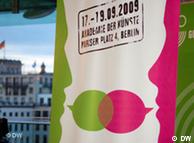Language | 19.09.2009
Languages without borders
Harry Hoerler lives on an island in the South Seas, located thousands of kilometers from Germany's coast – and yet he speaks a language quite similar to German.
It's called "Unserdeutsch" and it is the only Creole language in the world based on German. It emerged during colonial times, and today there are fewer than one hundred "Unserdeutsch" speakers in the world – and they are all multilingual, according to Craig Alan Volker, a language expert from Papua New Guinea.
 Bildunterschrift: Großansicht des Bildes mit der Bildunterschrift: Harry Hoerler speaks "Unserdeutsch", the only Creole language based on German
Bildunterschrift: Großansicht des Bildes mit der Bildunterschrift: Harry Hoerler speaks "Unserdeutsch", the only Creole language based on German
"Since the first generation, we have all spoken at least three languages – and often four or five," he said. These include German, English, and a variety of regional and indigenous languages.
A play based on Harry Hoerler's mother tongue was just one of around thirty events the Goethe Institute funded for "Languages without Borders", a project which aims to raise awareness of the importance of multilingualism in modern times.
Matthias Makowski, the language department head of the Goethe Institute, believes having knowledge of foreign languages is important in all areas of life – from business to politics to arts and culture.
"We believe that with these projects, we can put a spotlight on the issue of multilingualism," said Makowski. "And later we can pinpoint a strategy of how we're going to improve multilingualism next year or the year after that."
How multilingual is the EU?
Since 2007, the European Union has had a Commission for Multilingualism to try to strengthen language diversity.
Despite the numerous languages in the EU, in comparison to other continents – or even single countries – Europe falls short. For example, India alone has twenty-two official languages, which makes acquiring new languages a bit easier.
 Bildunterschrift: Großansicht des Bildes mit der Bildunterschrift: India has twenty-two official languages, but many there also study European languages
Bildunterschrift: Großansicht des Bildes mit der Bildunterschrift: India has twenty-two official languages, but many there also study European languages
"Somebody from the north, who speaks Hindi, wouldn't consider Tamil a foreign language. This is just another Indian language," explained Anil Bhatti, a German language professor in New Delhi. "Learning a foreign language then means learning a European language, for example. And for an Indian person, this could be their fourth or fifth language."
To speak four or five languages is still the exception in Europe.
According to the EU Commission, not knowing foreign languages could be bad for business. A 2006 study found that at least 945,000 small and medium-sized companies may be losing business due to "a lack of language competence".
Juergen Bolten, who oversees a section of "Languages without Borders" called "Multilingualism in the Economy", has proposed an incentive scheme for companies to encourage employees to learn another language.
"What I envision is a program whereby workers could receive rewards for participating in a foreign language initiative," said Bolten. "The companies could also receive 'bonus-points' when they prove that they have improved multilingualism in the workplace."
#b#
Language and immigration
As immigration to Europe grows, language has played a key role in the integration of new arrivals. In the EU, many countries require immigrants to submit to language testing.
However, Piet van Avermaet from the Association of Language Testing in Europe is skeptical about making such tests compulsory.
"When you take language as a condition for integration, it often does not work," he said. "It's often the other way around. When you reduce the problems of discrimination; when you improve the opportunities for people to find a job; when you improve your policy in relation to social integration; then at the same time the process of language acquisition emerges."
The Goethe Institute's "Languages without Borders" project wraps up in Berlin this weekend.
Author: Ricarda Otte (vj)
Editor: Susan Houlton
antigrafikon from DW.-------kefalonia-kai-kosmos. com


No comments:
Post a Comment